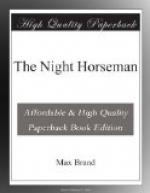So heavy was that tropical fall of water that the horses were bothered by the beating of the big drops, and shook their heads and stamped fretfully under the ceaseless bombardment. Indeed, when one stretched out his hand the drops stung him as if with lashes of tiny whips. There was no wind, no thunder, no flash of lightning, only the tremendous downpour which blended earth and sky in a drab, swift river.
The air was filled with parallel lines, as in some pencil drawings—not like ordinary rain, but as if the sky had changed into a vast watering-spout and was sending down a continuous flood from a myriad holes. It was hard to look up through the terrific downpour, for it blinded one and whipped the face and made one breathless, but now and again a puff of the rare wind would lift the sodden brim of the sombrero and then one caught a glimpse of the low-hanging clouds, with the nearest whiffs of black mist dragging across the top of a hill. Without noticeable currents of wind, that mass of clouds was shifting slowly—with a sort of rolling motion, across the sky. And the weight of the rain forced the two to bend their heads and stare down to where the face of the earth was alive with the gliding, brown waters, whose surface was threshed into a continual foam. To speak to each other through the uproar, they had to cup their hands about their lips and shout. Then again the rainfall around them fell away to a drizzling mist and the beating of the downpour sounded far away, and they were surrounded by distant walls of noise. So they came to the McDuffy place.
It was a helpless ruin, long abandoned. Not an iota of the roof remained. The sheds for the horses had dropped to the earth; but the walls of the house still remained standing, in part, with the empty windows looking out with a mocking promise of the shelter which was not within. Upon this hollow shack the rain beat with redoubled fury, and even before they could make out the place through the blankets of rain, they heard the hollow drumming. For there were times, oddly enough, when any sound would carry a great distance through the crashing of the rain.
A wind now sprung up and at once veered the rain from its perpendicular fall. It slashed them in the face under the drooping brims of their sombreros, so they drew into the shelter of the highest part of the standing wall. Still some of the rain struck them, but the major part of it was shunted over their heads. Moreover, the wall acted as a sort of sounding board, catching up every odd noise from the storm-beaten plain beyond. They could speak to each other now without effort.
“D’you think,” asked Haw-Haw Langley, pressing his reeking horse a little closer to Mac Strann, “that he’ll come out after us in a rain like this?”
But simple-minded Mac Strann lifted his head and peered through the thick curtains of rain.
“D’you think,” he parried, “that Jerry could maybe look through all this and see what I’m doin’ to-day?”




